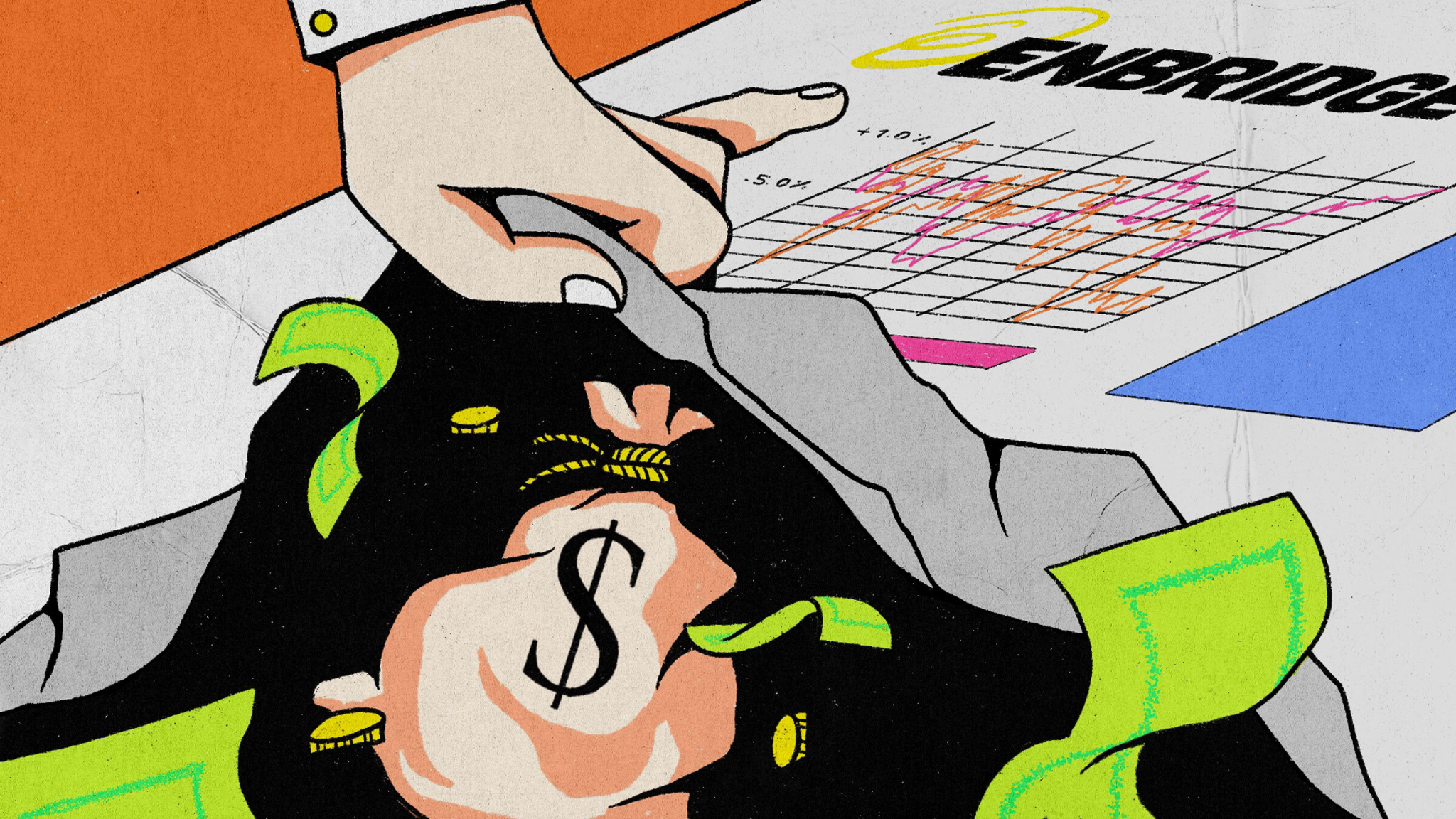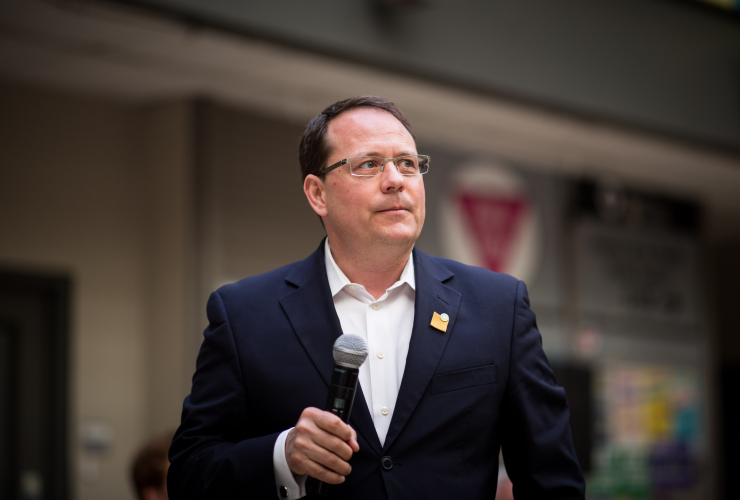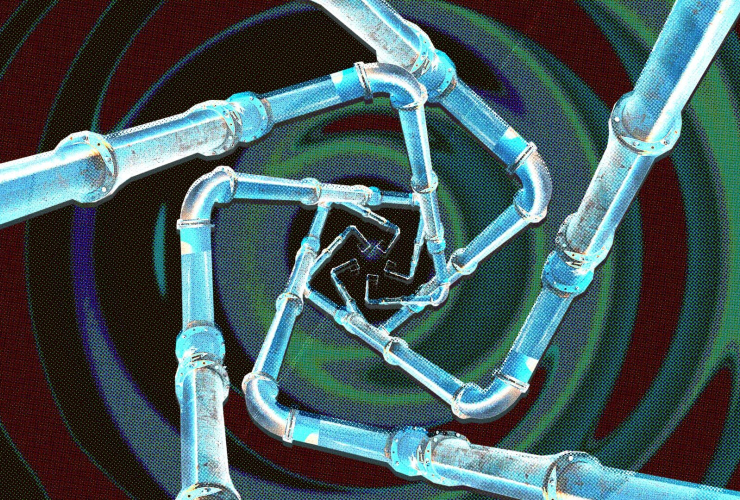A key study used by Enbridge in its application to expand its Ontario gas network erroneously inflated the cost of switching from gas to electricity to heat buildings by billions of dollars.
Enbridge is currently in hearings before the Ontario Energy Board (OEB) seeking approval for a customer rate hike to fund a massive gas network of new pipes across the province.
Evidence filed with the regulator includes a report from consulting firm Guidehouse commissioned by the Calgary-based fossil fuel company. It examined two paths to net-zero emissions by 2050 and concluded a heating grid with further gas investments is a far cheaper option than electric for home heating. Net zero is generally understood to mean a situation where any heat-trapping greenhouse gas emissions produced are offset by emissions absorbed from the atmosphere.
Enbridge used the study to claim electrification would be too expensive in the pages of the Toronto Star and has relied on it to justify further investments in natural gas infrastructure in Ontario. The company also referred to the Guidehouse study in a PowerPoint presentation as one of the “inputs” used to develop its “vision of Ontario’s energy sector,” which includes significant investments in gas infrastructure and renewable natural gas –– a fuel that some experts believe is greenwashing.
The study surprised experts from the Industrial Gas Users Association and advocacy group Environmental Defence, who are intervening in Enbridge’s rate hike application. Conclusions reached in the report contradicted other studies that state as the carbon price increases and the cost of wind and solar energy come down, renewable energy is the clear winner from a cost perspective.
Kent Elson, a lawyer representing Environmental Defence, wanted to see the assumptions the Guidehouse study relied on to reach its conclusion. Enbridge balked at releasing that information, and it took an order from the OEB to make the figures available for cross-examination.
“When they had to disclose what was underneath the hood, it became clear that it was just full of errors, so much so, they were forced to do a correction and that swung the results by $140 billion,” Elson told Canada’s National Observer. “It's an enormous set of mistakes.”
Despite the $140-billion swing, Enbridge defends the Guidehouse study. The analysis Guidehouse has since updated “reduced the differential between the two [scenarios] from $181B to $41B,” with the gas system still remaining as the lower cost pathway, an Enbridge spokesperson said.
“While the cost gap between the two scenarios has decreased, the overall findings of the study remain unchanged,” the spokesperson said.
Even though Guidehouse amended its faulty numbers, the report’s validity is still being questioned by experts.
After days of back and forth over the report’s findings at the hearings, the report’s authors conceded they are not experts on the best path forward for the energy transition. They also admitted they did not receive expert opinions on the best paths available. However, one of the report’s authors, Decker Ringo, defended the study, explaining they didn’t intend to analyze the “entire universe of potential pathways” and haven’t claimed that they did.
Previously, Enbridge has described the study as important because in recent years, “we feel that emissions reductions have become equated with just electrification,” Enbridge Gas vice-president for business development and regulatory affairs Malini Giridhar wrote in a sponsored content article in the Toronto Star.
“We don’t think of gas and electricity as alternatives. We actually want to be asking the question, ‘How can gas complement electrification?’” Giridhar wrote.
Burning fossil fuels to heat buildings is one of Canada’s toughest challenges in the race to decarbonize, causing more greenhouse gas emissions than power generation or agriculture. In Ontario, buildings are the third-largest source of planet-warming pollution, responsible for a quarter of the province’s total. Beyond the known climate impacts, gas stoves are also increasingly linked to diseases like asthma in children.
The climate science is clear that fossil fuels must be phased out, not simply made cleaner if the planet’s temperatures are to stabilize.
Canada and Enbridge’s goal is to reach net-zero emissions by 2050, 27 years from now. A typical building heating system lasts 20 years, according to evidence filed with the OEB. That means there’s one good shot left to replace gas furnaces, adding to the stakes of the ongoing hearing.
Elson worries if further gas investments are permitted, it will lock in more fossil fuels for decades to come and risks being extremely costly for customers unable to make the switch to renewables. Because renewable or energy-efficient technologies like heat pumps have a higher upfront cost, Enbridge could find itself in a situation where more affluent customers leave the gas grid in favour of cheaper renewables, leaving a shrinking pool of poorer customers footing the bill for gas infrastructure for decades.
“Both our expert Chris Neme and the expert for the Industrial Gas Users Association have found that [the Guidehouse study has] got a pro-gas bias, and can't really be relied on for what Enbridge is trying to rely on it for,” Elson said.
Neme is the co-founder and principal of the Energy Futures Group and has worked for decades in the energy industry. A 54-page report he wrote analyzing Enbridge’s application to expand its gas grid concluded the Guidehouse study at the centre of Enbridge’s justification is “highly biased” in favour of gas and thus “not credible.”
“Major declines in peak and annual gas demand are very likely in the future as efforts to decarbonize the Ontario economy accelerate,” Neme wrote. “This is the conclusion of most independent decarbonization pathways studies.”
According to Neme, there are multiple instances of “optimistic leaps of faith” made about gas to make that fuel appear economically viable, while “much more conservative assumptions are made about electric alternatives.” For example, Guidehouse assumes residential gas heat pumps and fully hydrogen furnaces can achieve high market penetration despite not being commercially available yet, while at the same time assuming electric heat pumps will fail to do so. The Guidehouse study also assumes the efficiency of electric heat pumps will degrade over time, but gas furnaces and heat pumps won’t.
In fact, Neme identifies at least 13 major issues with the Guidehouse study that amount to tipping the scales in favour of gas.
Evidence with the regulator shows the Industrial Gas Users Association agrees the Guidehouse study isn’t reliable. An expert hired by the Industrial Gas Users Association said it is “not sufficient to determine a path forward” and agreed the report has a pro-gas bias.
My Fellow Canadians,
My Fellow Canadians,
The natural gas industry must end. We cannot keep burning fossil methane and releasing its pollutants; the atmosphere is full. The corporations that handle natural gas may continue to exist for other functions; there may be business opportunities moving hydrogen to customers. But they must stop selling natural gas.
For now, we need natural gas, and their work; we will need it, on a steady decline, for a few decades yet. It will take decades to change all our industry and consumer technologies to the new alternatives, just as it took decades to move from coal to oil, a century back. We did that, and we can do this, without hurting any workers or consumers.
But we cannot even start until a politician brave enough to tell a massive industry that it must be sunset. We haven't seen that politician yet, so I'm running for office.
=====================
When I hear that speech, I'll have my new political hero I'll vote, donate, and volunteer for. Alas, I'm not holding my breath.
Job's open then Roy.....
Job's open then Roy.....
Personally I'm waiting for the lawsuits against big oil for all these decades of knowingly duping the public and loading our precious environment to the gills; charges of racketeering make sense and are being applied apparently according to desmog.com. iona
Interestingly, the same charges are being made against Trump in Georgia....
I'm also waiting for the International Criminal Court to bring charges for crimes against humanity.
These big oil guys are obviously a bunch of narcissists and psychopaths who have to be treated like Trump, the model for how to proceed.
"A key study used by Enbridge
"A key study used by Enbridge in its application to expand its Ontario gas network erroneously inflated the cost of switching from gas to electricity to heat buildings by billions of dollars."
Sure, yeah, "erroneously". I'm sure it was totally "erroneous". Not, like, lying through their teeth or anything. I mean come on, would Enbridge lie to us?
It's amazing how these
It's amazing how these bastards can murfle on. They're basically flat out saying with a straight face "Well, we think when it comes to not emitting carbon dioxide and methane, people shouldn't be thinking about excluding burning methane to make carbon dioxide, they should be thinking about how doing that could COMPLEMENT using electricity, because after all what is there about pipes leaking methane you then burn to make carbon dioxide that would make you think it would emit carbon dioxide or methane?"
Really, there should be a rule at these hearings that if you twist words that hard a court clerk has to kick you in the 'nads.
Haha, I'd pay to see that.
Haha, I'd pay to see that. Smoothly honed public relations and advertising of ever growing corporations all these years that has made us consumers above all else has pulled the wool over our eyes nicely until recently. Now the worm is turning...
There is a rare trace of actual honesty now at least where these corporate guys are admitting that the whole "green" thing has been a sop, a charade and it's back to business as usual, as in come on, let's get REAL here...
Offering subsidies for carbon capture called their bluff a bit, and was fun at first as they hectored the Liberals for parity with the I.R.A., but the having to actually do it has become a tedious pretence.
I suspect the upcoming cap will probably be like the recent framework for limiting subsidies and the net zero grid regulations, a soft serving of notice, but climate change itself is closing in with its own searing effect for those of us who are NOT psychopaths, narcissists or CEO's and visceral fear is growing.
I'm waiting for some version of revolution to storm the gates of power. Fear is extremely powerful and has galvanized those on the right in the usual twisted, stupid way but what happens when the reasonable, thoughtful left is seized with it along with completely justified white-hot rage?
I wonder how much getting
I wonder how much getting burned out will affect the viewpoints of people directly affected. The truth of it is that all of us will see, and continue to see, higher insurance rates, and it won't be long before all the insurance companies follow the lead of those who won't insure "building back" in proven flood-vulnerable locations.
But as far as government goes, I'm inclined to predict there'll be no cap on production, no cap on hard emissions, and no inclusion of Scope 3 emissions in the tally, but rather a theoretical "cap" on emission density, that won't require improvement of anything that government (i.e., taxpayers) don't pay for, entirely, without considering even the criminal count of subsidies that continue to be handed out.
Trudeau's caught on his own lack of business acumen at the time he bought us a pipeline. And he's not (ever, ever, ever-ever) going to back down on that. You can count on it, because not only his friends in the carbon fuel industries, but also his friends in the chartered banks (who'll counsel him to keep throwing good money after bad, because every toss results in ta-payer guaranteed returns before (and after) we have to pony up what he's committed us to ... and right in there with them will be the insurers who were convinced, on the basis of the federal guarantees, to provide the coverage the banks need to satisfy their own lending requirements.
I've not been wrong yet in my predictions regarding JT and the carbon cos' funding. All it takes is matching the cynicism demonstrated from on high.
There is room for a lesser degree of cynicism, but not with either JT or PP as PM. And I don't see JS ever cutting it. If Elizabeth May were PM, I'd be throwing a (green) party!!!! But as it is, no chance, no way.
Given the recent Auditor
Given the recent Auditor General's report on Ontario Greenbelt crimes, I'd be most interested in knowing what the Cons got out of this deal with Enbridge.
It violates environmental science.
It was ONLY ever available to Enbridge customers.
It stinks to high heaven.
Another one.
I'm confused. *What* was
I'm confused. *What* was only ever available to Enbridge customers????
The opportunity to pay through the nose till their furnaces die???
What's being proposed will *cost* Enbridge customers. It won't *help* them!!!!
What the ON Cons get is Ontario-based construction company business: roads, plants, clearing land, and building pipelines. I.e., more of the same thing they get from the GreenBelt BS.






Comments